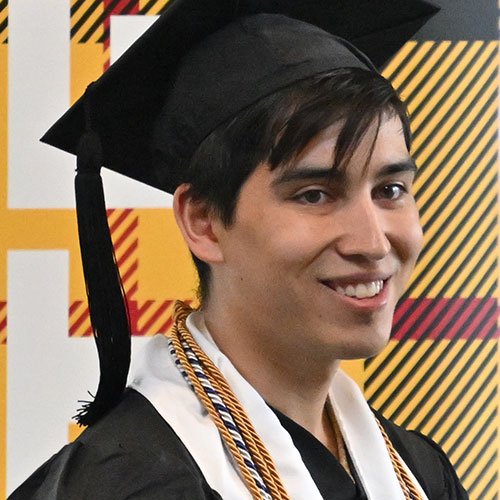
I.S. research explores psychology’s approach to historical trauma within Indigenous community

Alix Printup ’23 cares deeply about his Indigenous community—the Seneca Nation, the largest of six Native American nations which comprised the democratic government of the Iroquois Confederacy prior to the United States Constitution. He used his psychology and philosophy majors to mold his Independent Study around the historical trauma of his people, tied directly to their removal from their New York lands for the construction of the Kinzua Dam in the 1960s.
“Certain ways of thinking and institutions have put my people into the situation they are today, particularly regarding their health. This I.S. project was my way of calling for psychology as a practice to alleviate these health disparities.”
—Alix Printup ’23, I.S. title: The Necessary Inclusion of Historical Trauma in Trauma-Based Diagnoses and Subsequent Alternative Therapies Informed by Decolonial Philosophy: Indigeneity as a Philosophia Nata Ex Conatu
The dam was designed to protect Pittsburgh from flooding and pollution by using land, a great deal owned by the Seneca Nation, to accommodate space for flooding and condemnation. Despite the Indigenous community’s impassioned opposition, construction of the dam continued and cost them 10,000 acres of their Allegany Territory, nine communities, and 600 Seneca peoples their homes.
Drawing from the experiences and history of the Seneca Nation, Printup’s I.S. looked into the philosophical and societal presumptions that might explain why and how they lost land and communities to the dam and reservoir project. A philosophy and psychology major, he studied the actuarial consequences to Seneca health and culture and explored the sociocultural and health programs they created to address the consequences. “Certain ways of thinking and institutions have put my people into the situation they are today, particularly regarding their health. This I.S. project was my way of calling for psychology as a practice to alleviate these health disparities,” he said.
The focus of his research explored the idea of including historical trauma within the Diagnostic and Statistical Manual of Mental Disorders—commonly known as the DSM, the handbook of health care professionals for diagnosing mental disorders—and the concessions required for diagnostic criteria and the treatments for historical trauma.
Through his research and the guidance of his mentors, Lee McBride, professor of philosophy, and Bryan Karazsia, professor of psychology, Printup became interested in “the practical questions that come up” which includes his favorite—“How do we define a disorder?”
“This and many other questions like it within psychology as a practice come under scrutiny if historical trauma were to be included in the DSM,” he said. Printup blamed the background assumptions in psychology that are behind the creation, diagnostic criteria, and treatments that “cause and perpetuate instances of suffering of Indigenous peoples.”
Because the problems faced by Indigenous peoples are multifaceted and interdisciplinary, he said it is necessary to change past treatment and ways of thinking to include Indigenous peoples. “Psychology as a practice needs to embrace alternative knowledges such as those embodied within Liberation Psychology and Indigenous peoples themselves,” he added.
While the “necessary inclusion of historical trauma within the DSM is only a band-aid,” he concluded that the concept does not belong in the handbook. The next step could be to conduct a content validity project on existing trauma-based diagnoses such as looking at post-traumatic disorder to determine if it adequately measures or represents historical trauma.
Printup’s I.S. research more than prepared him for a prestigious internship after he graduates. He was selected for the Indigenous Summer Research Project at the University of Michigan where he will join The Research for Indigenous Social Action and Equity Center for an eight-week internship. “Going through weekly meetings and discussions for my I.S. research helped me to not only hone my thoughts but to be comfortable in academic discussions overall,” he said.
The center is a multidisciplinary collaborative of humanists and humanistic social scientists dedicated to achieving equity for Indigenous peoples throughout society. In addition to working with other Indigenous students, Printup will be paired with an Indigenous mentor to complete a social action and equity research project from a cultural psychology perspective.
He hopes to gain additional research experience to support his future academic goal to pursue a clinical psychology graduate degree. “As part of a group with little representation at higher education, this is the chance of a lifetime to pursue academic questions and actually talk with others of similar backgrounds and similar interests as mine,” Printup said.
Posted in Independent Study on June 4, 2023.
Related Posts
Related Areas of Study
Psychology
Do research, work with faculty mentors, and tailor a psychology program to your interests
Major MinorPhilosophy
Delve into ethical and moral debates while critically analyzing the issues facing humanity
Major Minor

